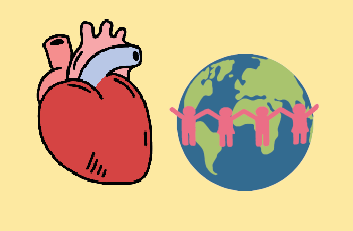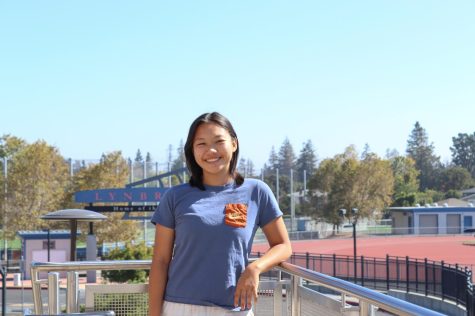Health/Ethnic Studies offered in 2023-24

Graphic illustration by Jasmine Rihal and Qianzi Loo
The Ethnic Studies/Health course will be piloted by incoming freshmen in the 2023-24 school year, and mandatory for all freshmen the year after.
March 10, 2023
The Ethnic Studies/Health elective is now open to FUHSD incoming freshmen as part of the 2023-24 school year. FUHSD aims to have approximately 60 students at each school to be enrolled in one semester each of Health and Ethnic Studies to pilot the curriculum. The curriculum development and advisory teams hope to receive feedback and implement revisions before the courses’ full rollout in the 2024-25 school year, when all incoming freshmen will be required to take the course.
Ethnic Studies Class
The Ethnic Studies class will focus on broad subjects like dominant narratives — the titular perspective in which history is told — and factors of one’s identity. The inquiry-based nature of the class will enable students to delve into different case studies to understand these topics. Examples can vary from African-American innovators and Latinx social movements to the model minority myth and indigenous mascots. Based on their classroom’s needs and interests, teachers will choose different case studies.
“It’s the teacher’s job to go to the student and say, ‘we learned some of these things, does that match or not match your experience? You tell me, what is the history of these groups?’” FUHSD Social Science Curriculum Lead Viviana Torres said.
FUHSD development teams have emphasized reflecting the demographics and diversity of each class or school to provide both a mirror — a reflection of one’s identity — and a window — a view into others’ perspectives. Matching the demographics of each site to their curriculum provides the proper windows and mirrors for students, enabling a key objective: developing cultural competence and humility.
Intersectionality, the interconnected nature of social categorizations that often create overlapping systems of discrimination or disadvantage, will also be a focus in the course. For example, a lesson on identity discusses intersecting factors that unite the Jewish-American community. Students will complete activities like “The Iceberg of Identity,” in which teachers will discuss how parts of one’s identity can be visible or invisible to others.
The class strives to guide students in asking open-ended questions that have many or no answers, so students can understand the complexity of social issues.
“For our district, ethnic studies will bring awareness to our diversity and encourage more equity and inclusion on campus,” said senior Khushi Nigam, student director for the Equity Task Force. “At Lynbrook, for students who feel their history curriculums don’t represent their backgrounds, the Ethnic Studies course will change that.”
The creation of this course follows the passage of Assembly Bill 101 that requires Calif. schools to roll out ethnic studies classes in the 2025-26 school year. The state’s goal is for curriculums to better reflect Calif.’s diverse population. Since FUHSD received sufficient funding to develop the course, it has chosen to implement the class earlier.
The development teams are also creating a plan to train teachers to teach the course according to state requirements. Through professional interdistrict learning communities, teachers will discuss lesson plans, share student work and learn what ethnic studies truly is.
“I hope that Ethnic Studies helps students feel that they are a part of the school community,” Torres said. “I hope students understand that they have agency, and that every student is a scholar and an expert source of their lives that can and should be included in every classroom that they step into.”
Health Class
The Health class will combine material from existing subjects from Biology and P.E. classes into a semester-long course. It will include topics like personal and community health; mental, emotional and social health; nutrition and physical activity; injury prevention and safety; and alcohol, tobacco and drugs. Sex education will still be taught in freshman Biology classes for the 2023-24 school year.
Personal and community health will teach students relationship skills and how to support others, resolve conflict and communicate needs and boundaries. The unit on mental, emotional and social health will focus on managing anxiety, coping with stress and developing self-care habits. In injury prevention and safety, students will learn first aid skills and how to respond to emergencies, from natural disasters to harassment. The curriculum hopes to foster a healthy attitude toward alcohol, tobacco and drugs in their respective units. In the nutrition and physical activity unit, students will learn how to start an exercise routine and become aware of physical habits.
There is opportunity for student personalization in the curriculum — students can choose a subtopic for a project at the end of each unit instead of a test. For example, after the injury prevention and safety unit, a student may create guidelines on how a community should prepare for natural disasters. The development teams have also emphasized cultural relevance in lesson plans.
“We wanted to keep in mind and honor that we are coming from lots of different backgrounds and really look at each topic in terms of how different habits can impact your health,” FUHSD Health Team Lead Pooya Hajjarian said.
The course hopes to address difficult topics, such as substance abuse. Lessons will not be fear-based, but instead, provide facts to discuss the reasons behind and impacts of unhealthy habits.
“I think that it will be important for the course to respect boundaries by making it clear that there is a safe person to talk to, and that the students don’t need to share anything that they’re not comfortable sharing,” HEAL secretary and sophomore Sandhya Padhmanaban said.
The team has also consulted with FUHSD’s wellness committee to address the needs of different communities.
“I hope that this is a class that helps students better understand themselves and build healthy habits,” Hajjarian said. “I hope students look back and say, ‘I have these habits because I started to develop them back in ninth grade.’”
–
Teachers of both Ethnic Studies and Health can also discuss the intersections between the two classes with students, like how race and gender impact accessibility to healthcare institutions.



























































